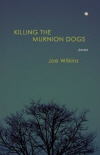Killing the Murnion Dogs
I’ve been dipping into Joe Wilkins’ Killing the Murnion Dogs all month like a box of Russell Stover’s candy. Unlike the box of chocolates, I haven’t picked a bad piece. Every poem is a little gem, like your favorite chocolate, not sweet but revelatory and exciting as it delivers moments of loss and gain.
I’ve been dipping into Joe Wilkins’ Killing the Murnion Dogs all month like a box of Russell Stover’s candy. Unlike the box of chocolates, I haven’t picked a bad piece. Every poem is a little gem, like your favorite chocolate, not sweet but revelatory and exciting as it delivers moments of loss and gain.
Then a friend usurped the book and read it front to back. “You should read these in order,” she told me. “There’s a chronology, a life story.”
“Like a memoir?” I asked.
“Exactly.”
So I did.
Wilkins’ poetry follows him through life with verse that dots the backwaters of states from North Carolina to Tennessee to Montana to Iowa, reflecting from a midlife vantage point while paying homage to this “brief crack of light” (I stole that from Nabokov) we call life.
One of the first poems that caught my eye was A Roadside Diner in Iowa. Wilkins covers much ground in this piece describing a simple roadside stop for pie and coffee. A distraction of boys playing Pac-Man “with that reckless sixteen-year old joy” sends the narrator into a reverie, “a small boat drifting back a muddy river of years.” Whatever the author’s intention was in stopping, it seemed to be diverted:
but all you can think about is how
you’ll never make love again
to that girl you knew in high school,
and you miss her small shoulders
and the way she smelled of apples,
so you order a slice of pie
and with that first forkful,
you know, no matter what,
you can keep driving.
While lamenting the fleeting pleasures of youth never to return, Wilkins takes refuge in the simple joys of everyday life:
Maybe
you come here every day,
because here every day is the same
and you love that above all things,
as your days are most times hard
and wrong and wrapping your cracked
hands around a cup of milky coffee
is the best thing you know.
By the end of the poem Wilkins comes to a heart-rending conclusion that perhaps few of us ever admit:
Maybe this is your life –
corned beef sandwich, fries,
one thin, bright slice of orange.
I was not familiar with the work of Joe Wilkins before I picked up this book, but the title caught my eye. What is, I wondered, a “Murnion” dog? I thought I knew all the breeds. Reading the book, I discovered that the title is taken from the collection’s longest poem, written in seven sections. Murnion is not a breed but a group of dogs owned by the poet’s childhood neighbor, Willie Murnion. The Murnion dogs kill the entire lot of sheep owned by Wilkins’ (then a six-year-old boy) family. The carnage is devastating, a farmyard Guernica that threatens the very livelihood of the farm:
And the lambs –
broke clean in half, sheep torn open
at the belly, gray loops
of entrails soft
in the sun. Some were still
alive, bleating heavy.
Killing a neighbor’s sheep is serious business. I lived on a farm once when the farmer down the road knocked on my door. He greeted me on my porch, a shotgun cradled in his arms.
“Your dog killed my sheep,” he claimed. Apparently he was ready to take revenge right there on my dog and/or me. My dog had an alibi, though—me. I fought for my dog’s innocence and finally my neighbor went away, albeit reluctantly. The lesson was clear, however: do not covet thy neighbor’s sheep.
Wilkins turns such dark moments into poetry:
Days later there were the pictures
in the county paper—
my mother pointing at the torn
and bloated carcasses,
my father and Willie Murnion
staring at their boots,
and one of me,
my small hand wrapped
around the spiral horn
of a fly-bitten skull
Memories of the dead sheep remained vivid through the years, while the images of Wilkins’ father, who died three years after the massacre, faded like a Polaroid too long in the sun:
My father is everywhere
but memory: He rises with the moon,
his arms the gnarled stalks of greasewood,
his breath the hot winds of the plains.
Justice comes, the mother tells Wilkins years later, in the same form of execution my neighbor demanded years ago. The guilty dogs are tied to a tree and shot one by one:
My mother shudders
as the rifles fire and six dogs howl
for the one who is dead.
Don’t despair for the wreckage and reflections on moments of loss. Wilkins provides moments of tenderness and playfulness in his book as well. In his poem The Big Dry, Montana, 1985, he paints a soft portrait:
Wind
Father comes in from a day on the tractor, his neck and face blown raw. Mother lays him down on the couch and rubs wool-wax into his skin. My brother and I watch from across the room. She sings softly. She is so tender with him. He smiles up at her. For a moment they have forgotten us, and everything else.
At his best, Wilkins recalls the rural flavor of Wendell Berry, but in a world all his own. Read him. This is your life; wrap your cracked hands around this book. Order some pie. You will keep on driving.





